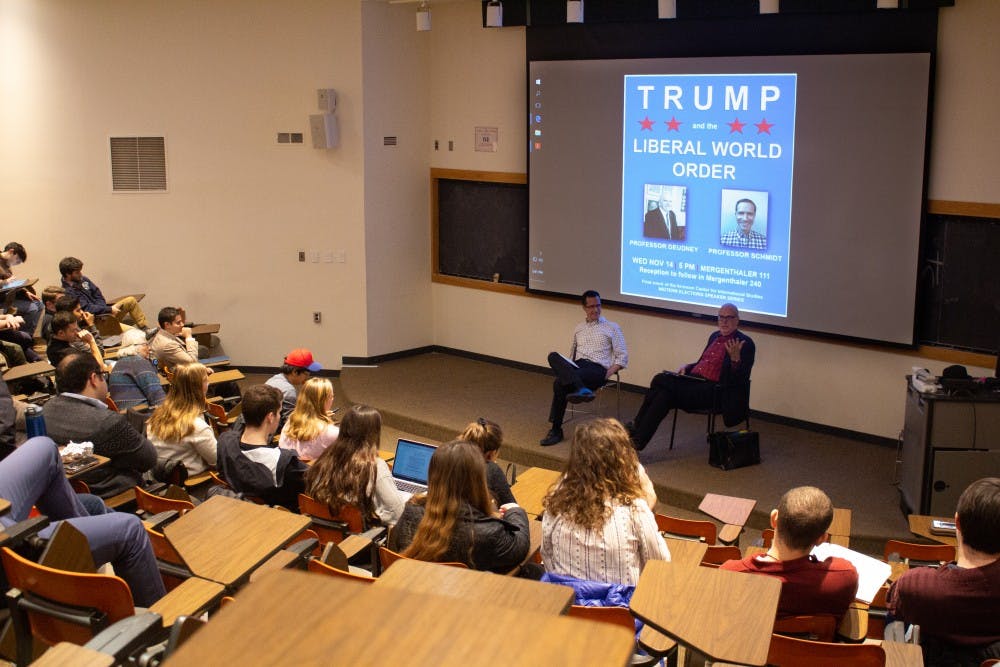The International Studies Program hosted its final event in its midterm elections speaker series, “Trump and the Liberal World Order,” on Wednesday. The event featured remarks from political science professors regarding Trump’s impact on free market principles, cooperation among nations and liberal democracy.
Sydney Van Morgan, International Studies program director and administrative director for International Centers and Programs, moderated the event. The two speakers were Daniel Deudney, associate professor of Political Science, and Sebastian Schmidt, assistant professor of political science.
Schmidt began by discussing ways in which the Trump administration runs counter to many of current international relations.
“Insofar as the liberal international order can be thought of as being constituted by rules, open trade, international institutions, multilateralism and respect for human rights, it’s pretty clear that Trump’s orientation is largely orthogonal to a lot of parts of that definition,” he said.
President Trump has recently criticized what he considers “unfair” trade imbalances suffered by the U.S. under the North Atlantic Treaty Organization (NATO).
Trump has also led the U.S. out of the Iran Nuclear Deal earlier this year, as well as the Paris Agreement of the United Nations Framework Convention on Climate Change (UNFCCC) in 2017.
“He is, as he recently described himself, a nationalist, which, in its broader implications is an expression of a preference for bilateral, or go-it-alone policies, generally a dislike for working with international institutions, rules and commitments and in general, a zero-sum view of international politics,” he said.
He emphasized the dangers of plutocratic capitalism, a type of oligarchy in which few rule on the basis of wealth. Deudney noted that Trump may be moving the U.S. towards this political direction, especially in light of controversies surrounding suspected tax schemes within his father’s corporation and his refusal to release his income tax returns.
With regard to trade and the possibility of bouncing back from challenges to liberal democracy, the two professors remain hopeful.
“We haven’t seen a further liberalization of global trade for reasons that are independent of Trump, but compared to where the world political economy was 30, 40, 50 years ago, we are in a much more open political economy given the deals that have been reached and regional trade pacts continue to be reached,” Schmidt said.
He further stated that the changes in current U.S. politics could be an indication of future issues regarding political freedom.
Deudney agreed, stating that there is a pattern of this type of behavior in recent years. However, he argued that this is not the worst type of anti-liberal policies the country has dealt with in its history.
“This is a set of very negative trends, but in the longer historical trajectory of liberal democracy, we have dealt with far worse; we have experienced much greater crises; we have experienced much greater challenges,” he said.
Many students came out to hear the professors speak. Van Morgan was enthusiastic about the event and noted the unusually high political engagement within the student body because of the midterm elections.
“Hopkins students whom I know in International Studies were actively talking about and were energized about this election in a way they haven’t been, particularly about the midterm elections, because usually, the midterm elections don’t get very much attention,” she said.
Elizabeth Duncan, president of the International Studies Leadership Committee, was also pleased with the attendance at the event and is hoping that students were able to make use of a meaningful learning experience.
“It’s just a great way to get International Studies students more involved on campus, to provide different lectures for them to interact with professors or students they didn’t know before,” she said.
Senior Emily Tatum attended the event and said that the midterm speaker series offered a wide perspective on a variety of issues, especially in regard to things that are important to voters during the midterm elections.
“The organizers as well as the speakers have also left ample time for Q&As, and I think that’s a really good way as a voter and as a student to learn more, because people are asking me exactly what’s on my mind and the takeaway of the event,” she said.





